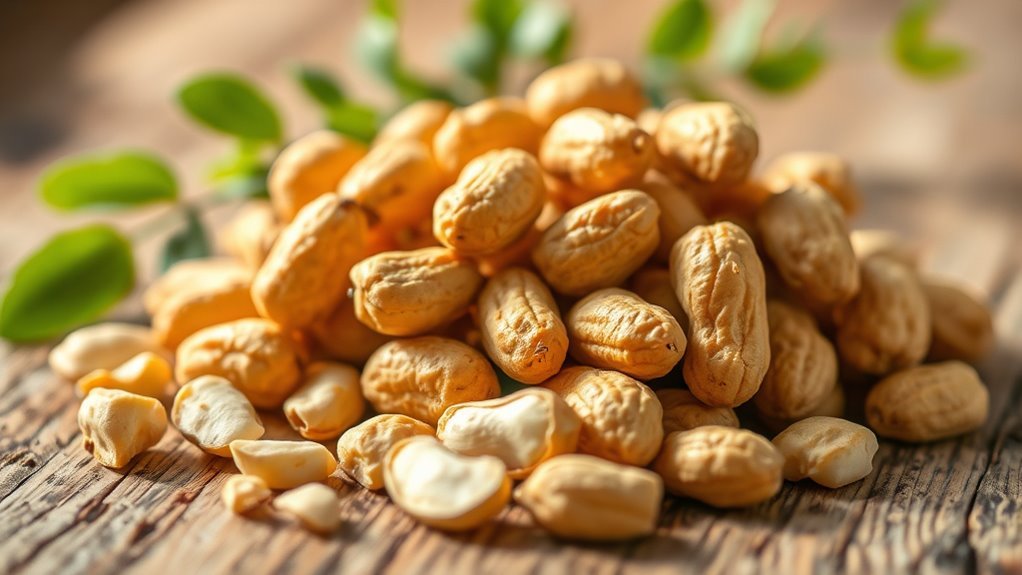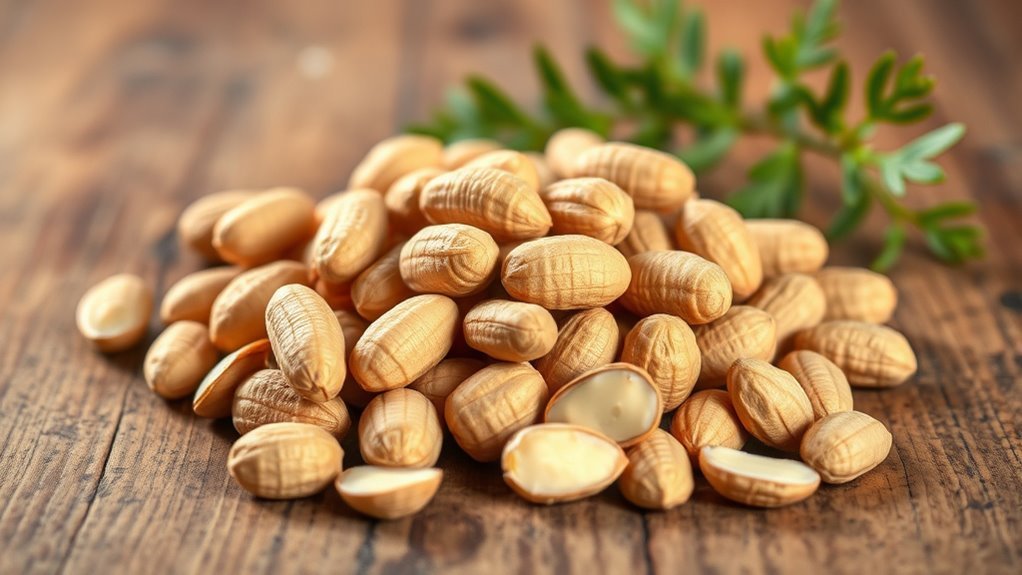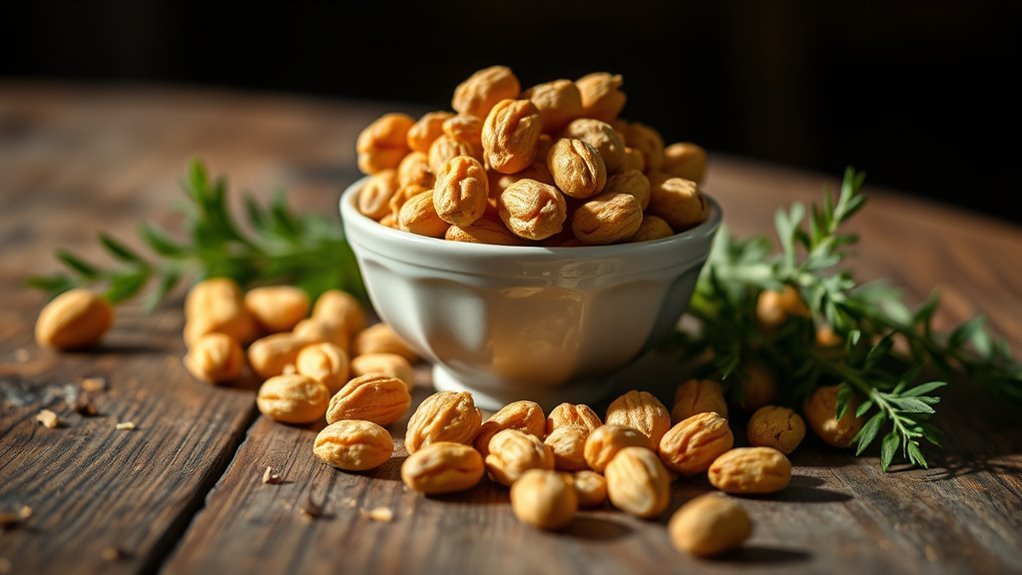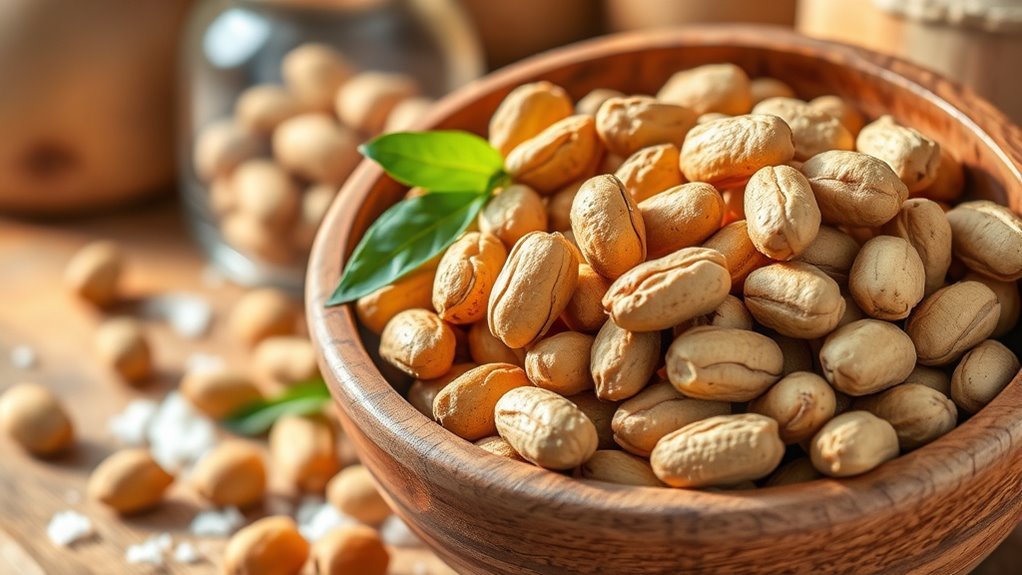Yes, peanuts can fit into a keto diet due to their healthy fats, protein, and relatively low net carbohydrate content. They provide about 6 grams of net carbs per ounce, making them manageable in moderation. Peanuts are rich in nutrients like magnesium and Vitamin E, promoting overall health. However, keep an eye on portion sizes and potential allergies. For some tasty ideas on how to include peanuts in your meals, there’s more to explore ahead!
Understanding the Keto Diet

When you’re diving into the keto diet, it’s essential to understand its core principles. The keto basics revolve around greatly reducing your carbohydrate intake while increasing fats. This shift nudges your body into a state of ketosis, where it burns fat for fuel instead of carbs. To successfully navigate this dietary journey, you’ll need to follow specific dietary guidelines. Aim for about 70-75% of your daily calories from fats, 20-25% from protein, and only 5-10% from carbohydrates. This balance allows your body to adapt effectively to burning fat. Remember, it’s about finding freedom in your food choices while maintaining the structure necessary for ketosis. Stay informed and flexible, and you’ll be well on your way to mastering the keto lifestyle.
Nutritional Profile of Peanuts

Peanuts can be an interesting addition to your keto diet, thanks to their unique nutritional profile. Different peanut varieties, such as Valencia and Spanish peanuts, offer distinct flavors and textures while providing numerous nutritional benefits. They’re rich in healthy fats, protein, and essential vitamins and minerals, like Vitamin E and magnesium. These nutrients can support your overall health while keeping your energy levels stable. Additionally, peanuts contain antioxidants that may help combat inflammation. Just remember to enjoy them in moderation, as their calorie density can add up quickly. Incorporating various peanut varieties can keep your diet diverse and enjoyable, all while aligning with your keto lifestyle. Embrace the freedom to explore different options within your dietary choices!
Carbohydrate Content and Its Implications

When considering peanuts on a keto diet, it’s crucial to look at their carbohydrate content. Peanuts contain about 16 grams of total carbohydrates per 100 grams, but when you factor in fiber, their net carbs drop considerably. Understanding this breakdown can help you determine if they fit within your daily carb limits.
Peanut Carbohydrate Breakdown
The carbohydrate content of peanuts plays a crucial role in determining their suitability for a ketogenic diet. Generally, peanuts contain about 6 grams of carbohydrates per ounce, which is relatively low compared to many other snack options. Their peanut glycemic index is also low, around 14, indicating they don’t greatly spike blood sugar levels. This makes them a more favorable choice for those watching their carb intake. However, portion control is key; consuming larger peanut serving sizes can add up quickly. For instance, a handful can exceed 15 grams of carbs, potentially disrupting ketosis. Balancing your intake while enjoying the nutritional benefits of peanuts can help you maintain your desired dietary freedom without compromising your keto goals.
Net Carbs Consideration
While considering the carbohydrate content of peanuts, it’s essential to focus on net carbs, which are calculated by subtracting fiber from total carbohydrates. Peanuts contain about 6 grams of total carbs per ounce, but with 2 grams of fiber, their net carbs drop to around 4 grams. This makes them a reasonable choice for those on a keto diet. However, if you’re looking for peanut alternatives, options like almonds and macadamia nuts offer even lower net carbs, which could suit your lifestyle better. Always keep in mind that moderation is key, as consuming too many can still impact your carb intake. By being mindful of your portions and choices, you can enjoy a satisfying snack without compromising your keto goals.
Fats in Peanuts: Good or Bad?
When considering the fats in peanuts, it’s important to recognize that they primarily contain healthy monounsaturated and polyunsaturated fats, which can benefit heart health. However, consuming peanuts in excess could lead to potential health risks, such as weight gain or allergic reactions for some individuals. Balancing your intake is key to enjoying their health benefits while minimizing any drawbacks.
Healthy Fats Overview
Understanding the fat composition of peanuts is essential, especially if you’re considering their role in a keto diet. Peanuts are a unique fat source, containing about 50% fat, primarily monounsaturated and polyunsaturated fats, which are considered healthy fats. These fats can help lower bad cholesterol levels and support heart health. Additionally, peanuts provide protein and fiber, making them a satisfying snack option. However, it’s important to consume them in moderation, as their calorie density can add up quickly. While they fit into a keto lifestyle due to their fat profile, balancing them with other healthy fat sources like avocados or olive oil can enhance your nutrient intake and keep your diet varied. Enjoying peanuts mindfully can contribute positively to your overall health.
Potential Health Risks
Although peanuts are often celebrated for their healthy fat content, there are potential health risks to reflect upon, especially for individuals on a keto diet. You should be aware of allergy concerns, as peanut allergies can lead to severe reactions in some people. Even if you’re not allergic, peanuts can cause digestive issues for others, such as bloating or gas, due to their high fiber content. Additionally, while peanuts contain monounsaturated fats, they also have omega-6 fatty acids, which, when consumed excessively, may lead to inflammation. Balancing your intake is essential, especially on a high-fat diet like keto. So, while peanuts can be a tasty snack, it’s important to take these potential health risks into account before including them in your meal plan.
Peanuts vs. Other Nuts on Keto
While peanuts are often grouped with nuts, they’re technically legumes, which can lead to confusion for those following a ketogenic diet. When you look at nut comparisons, peanuts have a higher carbohydrate content than many traditional nuts like almonds and walnuts. For instance, one ounce of raw peanuts contains about 6 grams of carbs, while the same serving of almonds has only 2.5 grams. However, various peanut varieties can offer different nutritional profiles, so it’s important to check labels. If you’re considering incorporating peanuts into your keto plan, moderation is key. Balancing your intake with lower-carb nuts can help you maintain your desired macros while enjoying a diverse range of flavors and textures.
The Role of Fiber in Peanut Consumption
When you think about incorporating peanuts into your diet, it’s essential to reflect on their fiber content, as fiber plays a crucial role in digestive health and can help you feel full longer. Peanuts are a good source of dietary fiber, offering about 2.4 grams per ounce. This fiber can promote regular bowel movements, preventing constipation and supporting overall digestive health. Additionally, the fiber benefits extend to weight management, as it helps curb hunger, making it easier to stick to your dietary goals. Including peanuts in a balanced diet can enhance your fiber intake, offering a healthy and satisfying snack option. Just remember to enjoy them in moderation to maintain a well-rounded keto lifestyle while reaping these benefits.
Potential Risks of Peanuts on a Keto Diet
Incorporating peanuts into your diet can offer fiber benefits, but there are potential risks to evaluate if you’re following a keto diet. While peanuts can be a tasty snack, consider the following:
- Peanut allergies: These can lead to severe reactions, making it essential to verify you’re not allergic.
- Digestive issues: Some people experience bloating or gas from peanuts, which might disrupt your keto journey.
- Carbohydrate count: Even though peanuts are lower in carbs than other snacks, they can still add up and impact your ketosis.
Being aware of these potential risks can help you make informed choices and maintain your freedom in following a keto lifestyle. Always listen to your body and consult a healthcare professional if you’re unsure.
How to Incorporate Peanuts Into Your Keto Meal Plan
If you’re looking to add peanuts to your keto meal plan, it’s essential to do so mindfully. Start by considering peanut butter, which can be a versatile option for keto snacks. Choose natural, unsweetened varieties to keep your carb count low. You can enjoy it as a dip for celery sticks or as a topping for keto-friendly pancakes.
Incorporate whole peanuts as a crunchy addition to salads or trail mixes, but be cautious with portion sizes, as they can add up quickly. Remember to balance your intake with other healthy fats, like avocados and olive oil, to maintain your macro ratios. By being intentional, you can savor peanuts while staying on track with your keto goals.
Personalizing Your Keto Journey With Peanuts
Personalizing your keto journey with peanuts can enhance your experience while keeping your meals exciting and nutritious. Peanuts offer versatility, from creamy peanut butter to protein-packed peanut flour, making them perfect for keto snacks.
- Enjoy guilt-free indulgence with peanut-based treats.
- Experiment with flavors to find your unique keto combination.
- Fuel your body with satisfying, nutrient-dense options.
Incorporating peanuts into your diet can add variety and balance, allowing you to create satisfying meals that fit your lifestyle. Just be mindful of portion sizes to stay within your carb limits. Whether you’re whipping up a low-carb peanut sauce or snacking on roasted peanuts, you can enjoy the freedom of crafting your personalized keto experience without feeling restricted.
Are peanuts keto-friendly?
Yes, peanuts can be considered keto-friendly. They are relatively low in carbohydrates and high in healthy fats and protein. A typical serving of peanuts (about 1 ounce or 28 grams) contains around 6 grams of carbohydrates, which makes them suitable for a ketogenic diet that typically restricts daily carb intake to around 20-50 grams.
How many carbs are in peanuts?
A one-ounce serving of raw peanuts contains approximately 6 grams of total carbohydrates, including about 2 grams of dietary fiber. This means that the net carbs (total carbs minus fiber) are around 4 grams, making them a suitable option for those following a keto diet.
Are there any health benefits to eating peanuts on a keto diet?
Yes, peanuts offer several health benefits when included in a keto diet. They are a good source of protein, which aids in muscle maintenance, and they are rich in healthy fats, particularly monounsaturated fats that can support heart health. Additionally, peanuts are high in antioxidants and vitamins such as Vitamin E and B vitamins, which can contribute to overall health and wellness.
Can I eat peanut butter on a keto diet?
Yes, peanut butter can also be included in a keto diet, but it’s important to choose natural varieties that do not contain added sugars or hydrogenated oils. A two-tablespoon serving of natural peanut butter typically contains about 6-8 grams of carbohydrates, with roughly 2 grams of fiber, resulting in about 4-6 grams of net carbs. Always check the label to ensure the product aligns with your dietary goals.
Is it possible to overeat peanuts on a keto diet?
Yes, while peanuts are keto-friendly, it is possible to overeat them, which could lead to exceeding your daily carbohydrate limit. Peanuts are calorie-dense and can contribute significantly to your total caloric intake if consumed in large quantities. Moderation is key; it’s best to stick to a reasonable serving size to maintain your keto goals.
References
- https://www.healthline.com/nutrition/peanuts-keto
- https://www.medicalnewstoday.com/articles/323362
- https://www.ncbi.nlm.nih.gov/pmc/articles/PMC6313445/
- https://www.fda.gov/food/food-labeling-nutrition
- https://www.nutrition.gov/topics/nutrition-through-life/healthy-eating/what-are-peanuts
- https://www.wisewell.com/blogs/blog/are-peanuts-keto-friendly
- https://www.ketogenic.com/peanuts-on-keto-diet/
- https://www.sciencedirect.com/science/article/abs/pii/S0195666319302546


